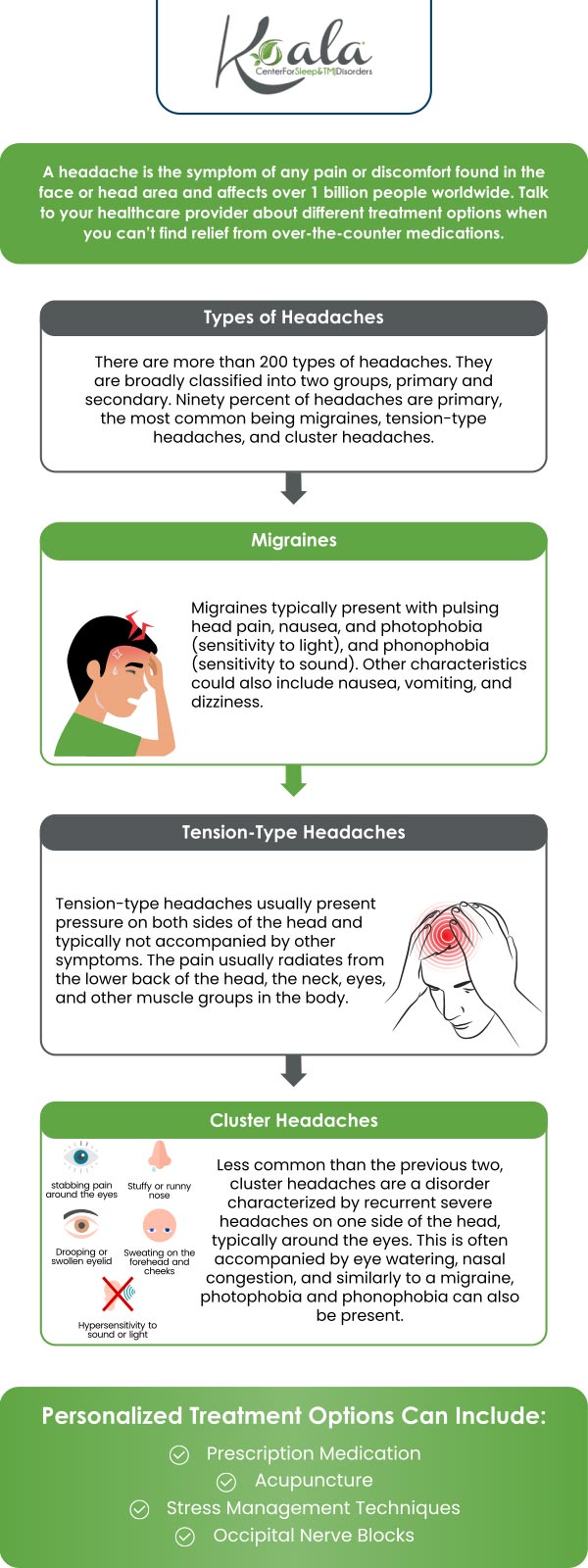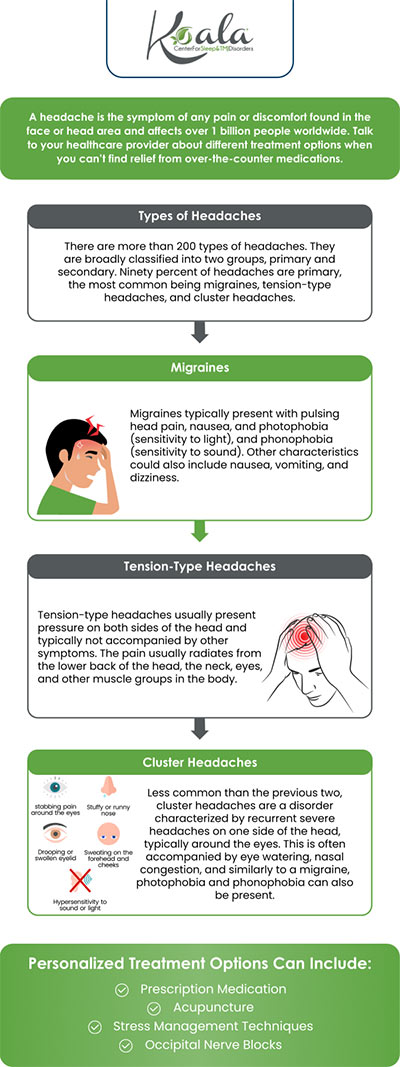Can a Lack of Sleep Cause Headaches?
Headaches caused by sleep deprivation can impact your life. It can cause persistent discomfort, difficulty concentrating, and irritability. If you have sleep deprivation headaches that last longer than 3 hours and are severe, come to Koala® Center For Sleep & TMJ Disorders and see our professionals. For more information, contact us or book an appointment online. We have convenient locations across the U.S. in Bloomington IL, Peoria/Dunlap IL, El Paso TX, and Wausau WI.




Table of Contents:
Why do I get a headache when I stay up late?
How long do sleep headaches last?
How do you get rid of a sleep headache?
How serious can sleep deprivation headaches get?
Lack of sleep can cause a variety of frustrating symptoms, including headaches and migraines. This occurs because the brain does not have enough time to rest and repair, leading to decreased neural plasticity. When you stay up late, you disrupt your body’s natural sleep-wake cycle, which experts refer to as the circadian rhythm. This disruption can affect your immune system, metabolism, and hormone regulation, leading to various health effects.
If you have poor quality sleep, you are more likely to experience tension in the neck and shoulders, which leads to headaches. Furthermore, inadequate sleep can exacerbate existing migraine symptoms. This is because the brain and nervous system become more sensitive to pain signals when deprived of restorative sleep.
Sleep deprivation can cause migraines, cluster headaches, tension headaches, and hypnic headaches. Each of these comes with its own set of symptoms and can cause severe discomfort. If you are often affected by headaches due to poor-quality sleep, it’s important to see a specialist for a diagnosis and effective treatment to alleviate your symptoms.
How long your sleep-deprived headache will last depends on the type of headache that is affecting you. For example, cluster headaches typically last between 20 minutes and three hours, while wake-up migraines can affect you for 4 to 8 hours. While hypnic headaches are quite rare, they can last anywhere from 15 minutes to 4 hours.
If your headache lasts for a while after you wake up, it can have significant effects on your daily life. It’s essential to address sleep-related headaches promptly to minimize their impact and improve your quality of life. By working with a healthcare professional, you can explore various treatment options, which include medications, lifestyle modifications, and therapies to manage headache symptoms.
There are various ways to address sleep headache symptoms, such as:
Headache medication – Depending on your doctor’s recommendations, you can use over-the-counter or prescription pain relievers to get rid of sleep headaches.
Light stretching – Gentle stretching exercises for your neck and upper back can release tense muscles and alleviate certain types of headaches. Neck rolls and shoulder shrugs are good exercises to try.
Hydration – If you’re dehydrated, you’re more likely to experience a headache when you wake up. To avoid this, you should stay well-hydrated throughout the day. In the morning, hot ginger or chamomile tea can be beneficial for headache symptoms.
Hot or cold therapy – Applying heat packs or cold compresses to the head, neck, or temples can provide soothing relief for headache symptoms.
Aromatherapy – Certain essential oils, such as lavender, peppermint, and eucalyptus, are known for their calming and pain-relieving effects. You can try using a diffuser for aromatherapy in the mornings to alleviate your symptoms.
If you still experience frequent or severe sleep headaches despite trying these remedies, it’s strongly urged that you consult a sleep professional for further evaluation and comprehensive treatment.
Headaches caused by sleep deprivation can cause severe symptoms and significantly interfere with your daily life by resulting in persistent discomfort, difficulty concentrating, and irritability. The cognitive symptoms caused by sleep deprivation headaches can hinder productivity at work or school as well as increase the risk of accidents.
In some cases, untreated sleep deprivation headaches can lead to various complications, such as depression, anxiety, and chronic pain disorders. These conditions can worsen headache symptoms and contribute to the cycle of sleep deprivation and declining health. To mitigate such consequences, it’s important to establish a regular sleep schedule, practice relaxation techniques, and track and report your symptoms to a healthcare professional.
Overall, it’s essential to see a professional if you are affected by sleep deprivation headaches to prevent the symptoms from affecting your general quality of life. To get started on the journey to symptom reduction and better quality sleep, schedule an appointment with one of the experts at Koala® Center For Sleep & TMJ Disorders. For more information, please contact us today or request an appointment online. We have convenient locations in Bloomington IL, Peoria/Dunlap IL, El Paso TX, and Wausau WI.

Additional Services You May Need
▸ KoalaKIDZzz®
▸ Sleep Apnea
▸ Snoring
▸ TMJ Disorder
▸ Fatigue
▸ Sleep Disorders
▸ Weight Loss
▸ CPAP Alternative
▸ Oral Appliances




